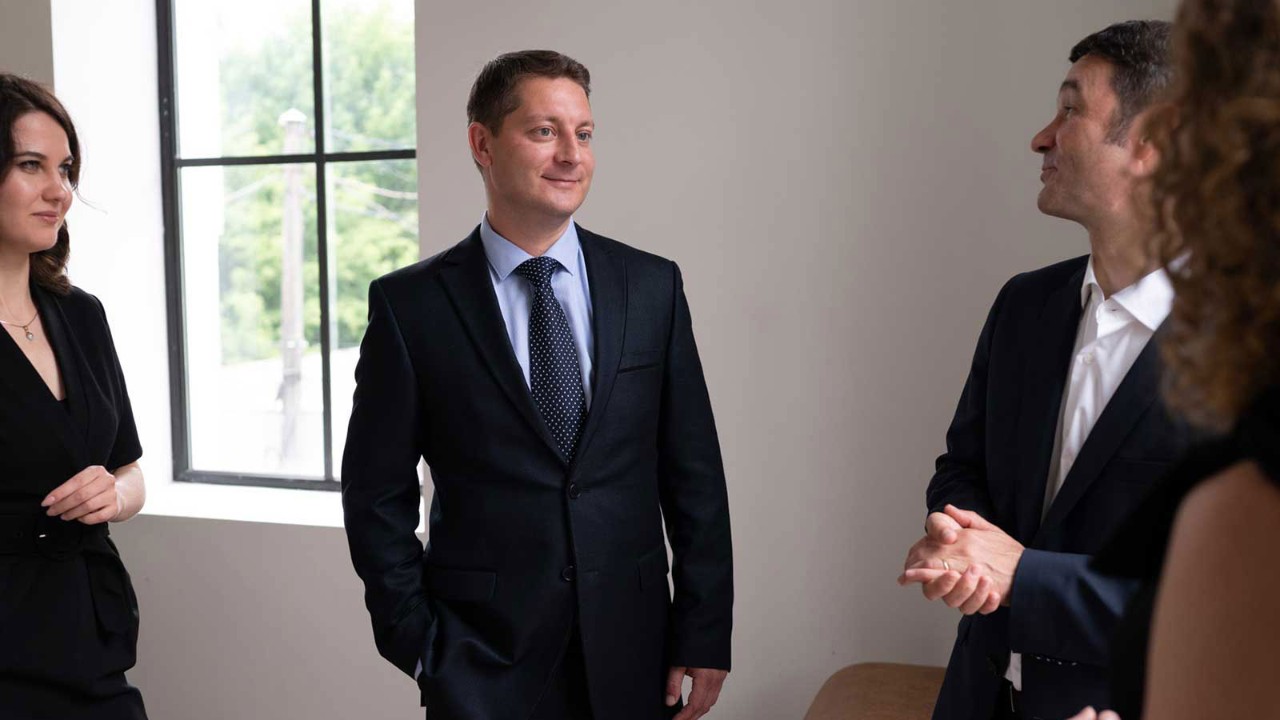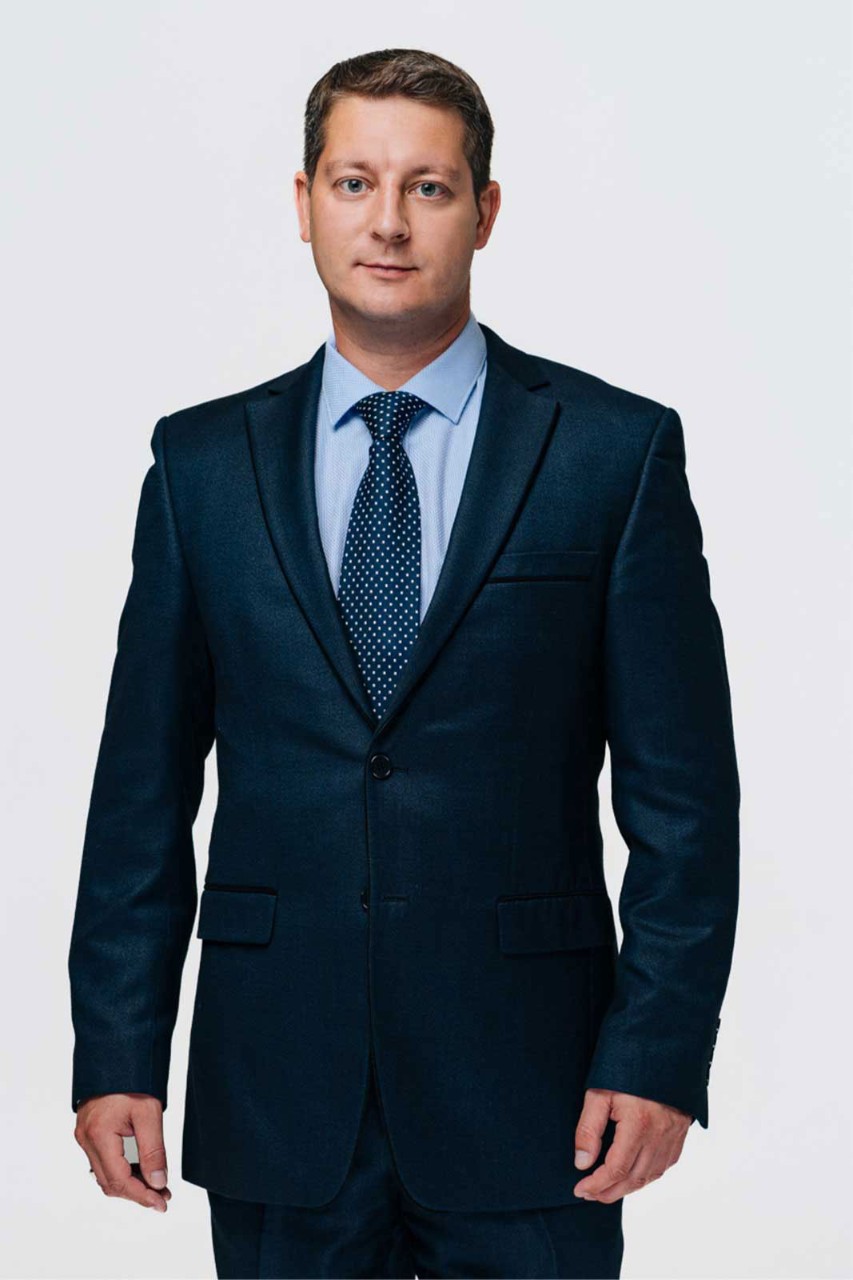
Dmytro Belianskiy is a Ukrainian, an ACCA member, a partner with international professional services firm Mazars in Kyiv and head of the firm’s outsourcing unit. But he also serves as a lieutenant in Ukraine’s armed forces (he cannot say which unit for security reasons). And as a mobilised soldier he is technically on standby to be sent to the front in Ukraine’s war with Russia.
But even as the war rages, Belianskiy exudes a thoughtful calm. He says he is in the ‘shape of my life’ and, two years since Russia’s invasion, mixes a determined enthusiasm for his work and business with reflections that are understandably emotional. ‘You have to value what you have,’ he says, ‘and don’t take anything for granted’.
‘We had bombs falling on us. We had a lot of sirens’
Belianskiy has been with Mazars for almost 11 years and was one of the firm’s youngest partners anywhere in the world when he was promoted in 2018 at age 33. Prior to Mazars he was an auditor with PwC after joining from university. He has a Master’s in International Economics from the Kyiv National Economics University and an MBA from the Kyiv School of Economics. He qualified with ACCA in 2011.
His time now is dominated by running Mazars’ outsourcing unit with international clients as august as the British Council, and as dominant as Apple and Amazon Web Services. Mazars provides book-keeping, tax compliance and payroll services. Perhaps not the most glamorous end of the business, but none-the-less essential and lucrative.
Miraculous growth
In fact, though the start of the war caused a slowdown, business is now growing. It is Belianskiy’s 39th birthday and the father-of-two (11 and 4) is dressed in a military t-shirt when he speaks to AB via Zoom. He reflects on the startling fact that, despite the war and missiles falling on Kyiv, all the firm’s services have remained functioning.
‘They continue. And we continue to grow. This was a big surprise for me. It’s kind of a miracle,’ he says.
The department has grown from seven staff, when Belianskiy joined, to 55 under his leadership with more than 70 permanent clients. Some left during the first few months after the invasion, but the majority remained and the client base has even expanded. However, business has changed, with development mostly coming from more work for existing customers.
‘Luckily, we were prepared by the pandemic and this helped us to switch very quickly during wartime’

‘Our growth, which is double-digit every year, usually comes mainly from new clients,’ Belianskiy notes. ‘But in the last financial year, most of the new growth was from additional requests.’
Astonishingly, client work continued from bomb shelters and from the 60% of staff who initially relocated overseas.
‘We had bombs falling on us. We had a lot of sirens, he recalls.
‘In the first few weeks what we needed to do first was to make sure that people were more or less safe. The second challenge was organisation of the remote work. Luckily Covid-19 taught us a lot; we were prepared by the pandemic and this helped us to switch very quickly during wartime.’
Continuity and stability
Belianskiy says the way the Mazars team adapted has now become part of firm-wide ‘lore’. His team, he says, ‘did not stop providing services for a single day’. Even across Zoom, Belianskiy’s pride in his firm and the people in his team is obvious.
But it was about more than just business continuity. ‘The job you’re doing gives you stability, psychological stability, because you have the support of your colleagues. We supported each other very well – informally, outside of work, as well. Most people – not only Mazars but also in Ukraine – share the idea that we need to support each other: regions, society, community and so on. It helps us.’
‘Yes, we really had a catastrophe. But at the same time, I have a family nearby and I have a job to do’
Beliankskiy also points out that the role of business in a country at war is not a frivolous one. ‘Business is supporting the army and Ukraine. It is very important. Business pays taxes to support the state and it provides a living, especially for those not at the front,’ he says.
Strength in adversity
He does not consider his leadership role overwhelming, even though there is ever-present danger and anxiety. ‘We became stronger,’ Belianskiy observes. ‘And maybe it’s not so stressful to be a leader right now. Why? Because I have been working [in Mazars] for 11 years and a lot of people have been with me for a long time; some of my managers worked with me for nine years. Our team is very stable.
‘That helps us support each other without unnecessary formalities. I never thought it was a burden to be a leader because I was not alone. I was supported by my team, my peers and the whole Mazars partnership.’
And Belianskiy is still looking forward. He welcomes the reconstruction of Ukraine – a big discussion in business circles at the moment – ‘as soon as possible’ and anticipates good opportunities for work, jobs and Mazars itself. He still has career aspirations and describes himself as ‘very ambitious’.
‘Even now we are planning new products,’ he says, and the firm remains ‘adaptable’ and ‘competitive’.
Maintaining positivity
But any rumination on the future inevitably leads to an assessment of the present. ‘Look, it’s been two years of war and humans are very interesting creatures; they can get used to anything. We are not in the worst position; it could be much worse,’ he declares.
‘Yes, we really had a catastrophe. But at the same time, I have a family nearby and I have a job to do. I have a community and everyone in this community believes in victory, and doing everything to make that victory come sooner rather than later.
‘I also have my military duty. I am doing something for my country. So my life makes sense. I cannot say I’m depressed – you see, I’m smiling.’



